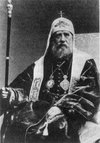Difference between revisions of "Template:Featured"
m |
(ROCOR and OCA (Special Feature)) |
||
| Line 1: | Line 1: | ||
| − | <!--- COMMENT ON [[Category_talk:Featured Articles]] TO GET YOUR ARTICLE FEATURED ---> | + | <!--- COMMENT ON [[Category_talk:Featured Articles]] TO GET YOUR ARTICLE FEATURED ---><div style="float:left;margin-right:0.9em;"> |
| − | <div style="float:left;margin-right:0.9em;"> | + | [[Image:Tikhon of Moscow.jpg|100px|St. [[Tikhon of Moscow]]]] |
| − | + | <!--nb. portrait images at ~100px, landscape images at ~200px--> | |
</div> | </div> | ||
| − | + | '''[[ROCOR and OCA|The ROCOR and the OCA]]''' have a complicated history of cooperation, rivalry, and sometimes outright hostility. These two [[jurisdiction]]s, the '''[[Russian Orthodox Church Outside Russia]]''' (ROCOR) and the '''[[Orthodox Church in America]]''' (OCA), both have their origins in the [[Church of Russia]] (a.k.a. the ''Moscow Patriarchate'' or ''MP''), and their histories as clearly distinct and identifiable entities both stem from the Bolshevik Revolution in Russia in the early 20th century. | |
| − | [[ | ||
| − | '''[[ | ||
| − | |||
| − | |||
| − | |||
| − | |||
| − | |||
| − | |||
| − | '''''Recently featured:''''' [[Diocese of Washington and New York (OCA)|Diocese of Washington and New York (OCA)]], [[Book of Kells]], [[Archangel Gabriel]], [[Alexis of Wilkes-Barre]], [[Theophany]], [[Nativity]], [[Theological School of Halki]], [[Alexander Nevsky]], [[Episcopi vagantes]], [[Joseph the Hesychast]], [[Eucharist]]. ''Newly [[:Category:Featured Articles|featured articles]] are presented on '''Saturdays'''. | + | '''''Recently featured:''''' [[Pascha]], [[Diocese of Washington and New York (OCA)|Diocese of Washington and New York (OCA)]], [[Book of Kells]], [[Archangel Gabriel]], [[Alexis of Wilkes-Barre]], [[Theophany]], [[Nativity]], [[Theological School of Halki]], [[Alexander Nevsky]], [[Episcopi vagantes]], [[Joseph the Hesychast]], [[Eucharist]]. ''Newly [[:Category:Featured Articles|featured articles]] are presented on '''Saturdays'''.' |
Revision as of 19:06, May 15, 2007
The ROCOR and the OCA have a complicated history of cooperation, rivalry, and sometimes outright hostility. These two jurisdictions, the Russian Orthodox Church Outside Russia (ROCOR) and the Orthodox Church in America (OCA), both have their origins in the Church of Russia (a.k.a. the Moscow Patriarchate or MP), and their histories as clearly distinct and identifiable entities both stem from the Bolshevik Revolution in Russia in the early 20th century.
Recently featured: Pascha, Diocese of Washington and New York (OCA), Book of Kells, Archangel Gabriel, Alexis of Wilkes-Barre, Theophany, Nativity, Theological School of Halki, Alexander Nevsky, Episcopi vagantes, Joseph the Hesychast, Eucharist. Newly featured articles are presented on Saturdays.'
